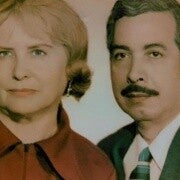
My parents divorced when I was 11 and eventually I did move to Nogales to live with my Dad. I visited my grandparents much more frequently during my teenage years and would ask them stories about their lives as they grew older and I became aware of how precious time with them was. My cousins and I would sit on the carpet and uncover scrapbooks and family photo albums and my nana and tata would tell us stories about the photos and their lives. I wish I had the ability to press play and hear the stories that fading memories don’t do justice.
After entering college, I developed a passion for all history. I was mesmerized by the past. I went to graduate school and was bitten by the archives bug immediately. I did an internship in Special Collections and saw how much representation mattered and how very little of it reflected who I was. Where were the queer archives that documented that part of my story? Where were all the people of color? I knew by the time I left graduate school that I wanted to be an archivist and give voice to these lost histories.
I’d like to say that I’m the family historian, but I’m not. During my twenties, my mom disappeared from our lives and put into storage all our family history. Every box. Every faded photo. All the handmade cards and letters. When the storage shed was nearly ready to be auctioned off, my sisters did their best to retrieve some of what was left but most could not be salvaged due to flooding in the storage unit. My mom eventually returned, and we loved her back to life, but we lost a part of our childhood in the process.
On my father’s side, there is still hope I might someday be able to take custody of what has been passed down to family members. My grandparents are both now deceased, and the family is now residing across a few states. I hope someday to inherit what is my dad’s so that it may be properly preserved. Perhaps even donated as a collection. As for my own personal archives, I have documented my family and friends, and my life with my partner and our dogs. Years pass quickly. I am approaching 40 years old and I have my own collection to share about the past. They are my treasures and tangible pieces of history about triumph over adversity and lives rich with love.
As a member of the team working on the Mellon Grant to Engage, Educate and Empower communities to preserve their archives and oral histories, it has been exciting to help others share their stories and preserve their histories before they are lost. This has special meaning to me as someone who has lost the mementos of my childhood and never recorded my grandparent’s stories. It is my hope that by teaching people how to preserve their personal history, we enrich the historical record with access to more voices from all walks of life.